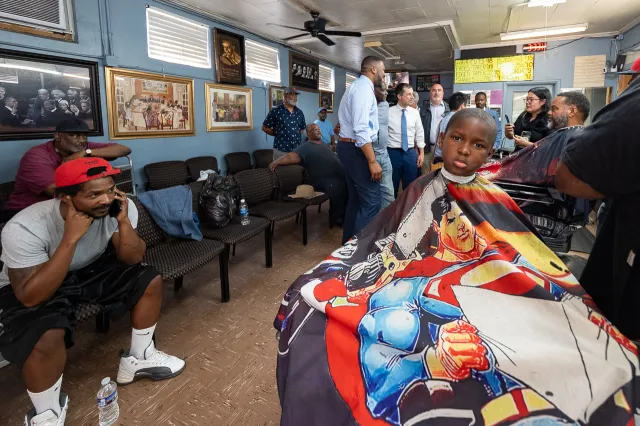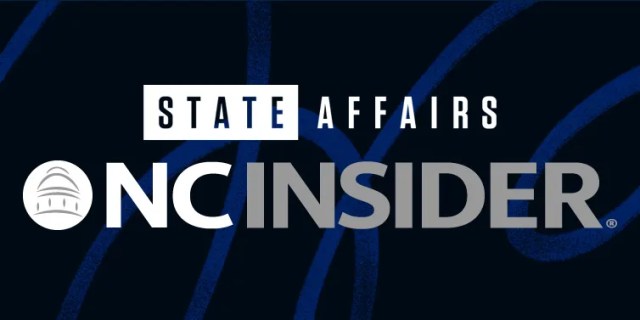You Don’t Say
“It has been a great honor to be a member of the North Carolina Senate and to serve the people of the East, I am incredibly thankful to have been chosen by them for this life experience.”
Sen. Jim Perry, R-Lenoir, announcing his retirement on Tuesday. (The New Bern Sun Journal, 7/02/24)
Note to Subscribers
The Insider, 7/03/24
The Insider will not publish on Thursday, July 4 in observance of Independence Day. Publication will resume Friday, July 5.
Perry Resignation
Will Doran, WRAL News and Trevor Dunnell, The (New Bern) Sun Journal, 7/02/24
A Kinston Republican who had been seen as a rising star in the state legislature, before announcing he wouldn’t seek reelection in 2024, resigned his seat Tuesday.
Sen. Jim Perry, R-Lenoir, was appointed to fill a vacancy in the Senate in 2019 and has since risen to become Senate majority whip — a top leadership position tasked with keeping the Republican caucus in line and voting as a bloc — as well as serving as co-chairman of the Senate Finance Committee. But he announced late last year that he wouldn’t seek reelection.
“It has been a great honor to be a member of the North Carolina Senate and to serve the people of the East,” Perry said in a Facebook post Tuesday morning. “I am incredibly thankful to have been chosen by them for this life experience. I am also thankful to my family for enduring the scheduling demands of me serving in the North Carolina General Assembly.”
In December, Perry pivoted from his original announcement of seeking re-election due to personal reasons and injuries sustained from a hunting accident. “I am entering a season of life where I will need more time to support those closest to me,” Perry said in December.
Perry’s resignation drops the Senate below the threshold needed for Republicans to guarantee a veto-proof supermajority.
However, the legislative session is now mostly over, with the final major actions all wrapping up this past week. Lawmakers could come back sporadically this summer and fall to consider veto overrides or for another attempt at writing a new state budget. Any veto overrides are unlikely to happen until a replacement for Perry is seated, though.
County-level GOP leadership in Lenoir, Craven and Beaufort counties will now be able to nominate someone to take his place, at least until the winner of this year’s election is sworn in in January. State law says vacancies in the legislature are filled by the local political party or parties of the district in question.
Bob Brinson won the Republican Party primary to run for Perry’s seat this November. He’ll face Democratic candidate Charles Dudley. [Source 1] [Source 2]
Clifton Dowell, State Affairs Pro, 7/03/24
U.S. Transportation Secretary Pete Buttigieg joined Gov. Roy Cooper for a walk Tuesday along a busy Durham transit corridor that should get safer in the future thanks to $12 million in federal infrastructure funding.
Buttigieg is making stops around the country to highlight projects funded as part of President Biden’s infrastructure package. While many projects grab headlines — such as the $1.3 billion passenger rail line that broke ground Monday in Raleigh — most of the 57,000 projects approved so far are more modest, and sometimes long overdue.
“You’ve got a community here that has been left out of some of the historic rounds of transportation infrastructure investment,” Buttigieg said, standing in front of Antioch Baptist Church on Holloway Street. “We’re changing that and it’s going to matter to neighbors, it’s going to matter to businesses, it’s going to matter to the congregation of this church.”
The grant announced on June 26 is intended to improve safety and efficiency along Durham’s Holloway Street corridor, which is the city’s busiest transit route. It will improve 33 intersections — including Americans with Disabilities Act curb ramps and crosswalks — and upgrade bus stops with the aim of improving access to the city for residents without cars, and reducing the number of vehicle and pedestrian accidents.
The total projected cost of the project is just over $15 million, with the city providing about $3 million to match the $12,044,800 federal grant.
Stretches of the route walked Tuesday saw sidewalks give way to weedy gravel.
“People here deserve excellent sidewalks and transit service, all the other things that a good streetscape ought to have,” Buttigieg said. “The vision has been here for a long time, but not the money. We’re here to change that.”
It is the second day Cooper and Buttigieg have reviewed projects in the state. In addition to the passenger rail line slated to run from Raleigh to Richmond, Va., the two have also visited the groundbreaking of the Salem Parkway Multi-Use Trail in Winston-Salem, North Carolina Agricultural and Technical State University’s Transportation Institute in Greensboro, and a highway project in Raleigh.
“North Carolina has gotten a large part of this pie,” Cooper said. “So we’re glad to have Secretary Buttigieg here to just review some of the projects all across our state that are really going to help improve transportation.”
Durham Mayor Leonardo Williams said there are always more projects than money, but Durham was ready with an existing need when the grant program was established. “If you focus on what exists, you’ll identify really soon what’s most attainable,” he said. “Folks want to see these projects completed and … we have to deliver.”
Medicaid Expansion
The Associated Press, 7/02/24
North Carolina Medicaid managed care has finally been extended to Medicaid enrollees who also need services for behavioral health or intellectual or developmental disabilities. More than 210,000 people could benefit from “tailored plans” that launched on Monday, according to the Department of Health and Human Services.
“This is another critical milestone in our work to build a stronger, more outcomes-oriented and accessible behavioral health system for North Carolina,” state health Secretary Kody Kinsley said in a recent news release.
Under the initiative, enrollees were formally told in the spring that starting July 1 their care would be handled through one of four companies based on geographic areas. While patients will continue to receive their array of services related to their disabilities or mental health needs, they’ll also now use primary care physicians, doctors and specialists within their plan’s network.
In July 2021, about two-thirds of the state’s Medicaid enrollees switched over from a traditional fee-for-service system to one in which health plans received monthly payments for each patient they enrolled and treated. But such changes were postponed for people with severe disabilities and mental health needs.
A “tailored plan” start date had been set for December 2022, but DHHS pushed it back multiple times, citing the need for more contract service providers and technical challenges for behavioral health organizations to coordinate the care.
Almost 3 million people in North Carolina are now enrolled in some version of Medicaid, according to DHHS data. They include adults who began qualifying for Medicaid late last year after the state accepted the expanded coverage provided through the 2010 federal Affordable Care Act.
With tailored plans now online, about 587,000 enrollees won’t be in Medicaid managed care, the department said on Tuesday. They include those who are both eligible for Medicaid and Medicare; certain adults with disabilities who receive community- and home-based services; and others who receive limited services such as for family planning, DHHS said.
Enrollees who otherwise qualify for tailored plans but opt out may miss out on services that other Medicaid managed care plans don’t provide, according to a DHHS presentation.
Medicaid managed care in North Carolina began with a 2015 state law laying the groundwork, followed by extensive preparations — and delays. Managed care has been portrayed as improving health outcomes and controlling costs. [Source]
Voucher Expansion
Ann Doss Helms, WFAE Radio, 7/02/24
An infusion of cash to clear the waiting list for North Carolina’s Opportunity Scholarships — public money that helps families pay private-school tuition — seemed like a sure thing. Last year’s eligibility expansion led to a surge in applications: 72,000 new students seeking scholarships for 2024-25, compared with fewer than 12,000 the year before. That meant the money allocated ran out with more than 50,000 students still on the waiting list.
Republican leaders of the state House and Senate agreed to pump $248 million into the current budget to clear that list before schools opened. With the state running a surplus, the money was there. And the GOP had enough votes to override Democratic Gov. Roy Cooper’s near-certain veto. But when the General Assembly adjourned last week without updating the budget, the additional voucher money was a casualty, with the start of the school year less than two months away.
Mike Long, of Parents for Educational Freedom in North Carolina, a leading voucher advocacy group, called the lack of action “a head-scratcher.”
“We are frustrated. We’re disappointed for these families, because we are certainly hearing from them with their frustration and disappointment,” he said Monday.
In this year’s legislative short session, the Senate passed a standalone bill that would have provided $248 million to clear the wait list for Opportunity Scholarships, along with $24.7 million to clear the waitlist for a separate program that provides tuition assistance for students with disabilities. But the House took no action on that bill, instead folding voucher funding into its budget bill.
House Speaker Tim Moore said the House wanted to pair the vouchers with more public school funding, including additional teacher raises proposed in the House’s budget bill. “We feel like it needs to be done in a comprehensive manner, for doing more with the surplus to help the traditional public schools,” Moore told reporters after the session. “I think it’s going to happen. It’s just a matter of when.”
The adjournment resolution lists several dates later this year when the legislature will reconvene. But even if lawmakers reach an agreement on additional voucher money, it will come after the school year starts.
“The 52,000 families have to make decisions for school now,” Long said. [Source]
New Laws
Luciana Perez Uribe Guinassi, The News & Observer, 7/02/24
North Carolina lawmakers passed new laws last year and this year. Several took effect on July 1, including ones related to elections, trees around billboards and the N.C. High School Athletic Association’s authority.
Here are the laws that took effect Monday:
Senate Bill 747: “Elections Law Changes.” This is an expansive GOP-drafted law that has a slew of what are called “election integrity” measures pushed by conservative groups. This includes eliminating the three-day grace period for receiving absentee ballots. Instead, ballots must be received by 7:30 p.m. on Election Day to count. Sections taking effect in July deal with requests to be excused from jury duty and a new requirement that state and county boards of elections maintain a list of eligible voters and update it to cut ineligible voters. Parts of this law are being challenged in the courts. A federal judge also temporarily blocked portions related to the notice process for voters who voted using same-day registration. Democratic Gov. Roy Cooper vetoed this bill but it was overridden by the GOP-led legislature.
House Bill 198: “DOT Legislative Changes.” As of July, a vehicle identification number (VIN) or other vehicle identifying information must appear on toll bills. Processing fees for tolls not paid within the required time are also increased from $6 to $9. The late fees were previously capped at $48 per bill per year; this law raised that cap to $72. Also now in effect under this law is a provision allowing billboard companies to cut down more trees along the state’s highways — 500 feet before the sign, up from 350 — and removing protection for redbud trees. Cooper vetoed this bill. It was overridden.
House Bill 600: “Regulatory Reform Act of 2023.” This law lightens water quality requirements for a pipeline project called MVP Southgate. Cooper vetoed this bill saying it would “result in dirtier water, discriminatory permitting and threats to North Carolina’s environment.” The veto was overridden. Sponsors of the bill have said it will help reduce regulatory burdens. Sections taking effect in July make changes to the commercial cellular network.
Senate Bill 552: “Modifications to Notary Public Act.” This law makes various changes to the state’s notary act, many of which took effect months ago. Starting July, electronic notaries who are not licensed North Carolina attorneys are prohibited from rendering services or advice that constitutes the practice of law.
Senate Bill 615: “Adoption Law/ Notary Changes/ Guardianship Rights.” The section that took effect July 1 requires an electronic notary who does a remote notarization to record the remote electronic notarization in an electronic journal.
House Bill 971: “Human Trafficking Changes.” This law makes various changes to trafficking laws including increasing the penalty for a first offense of soliciting another for prostitution. Sections that took effect in July would allow campus police agencies access to the Criminal Justice Law Enforcement Automated Data System, a database with information on offenders.
Senate Bill 452: “DOI & Insurance Law Amendments/ Revise High School Athletics.” This law shifts authority away from the N.C. High School Athletic Association, including by requiring it to enter into an agreement with the Superintendent of Public Instruction, with reporting requirements, audits and stronger oversight.
House Bill 674: “Child Advocacy Centers/Share Information.” This law establishes criteria for child advocacy centers to receive state funding such as requiring a forensic interviewer to conduct on-site interviews with children who may have been abused. It also provides civil liability immunity to members and volunteers of an advocacy center in certain instances for “acts done in good faith,” says the law. The law also delineates what records can be shared between advocacy centers, health providers, law enforcement and others.
House Bill 11: “Schools for the Deaf and Blind.” Sections of the law that took effect in July create a board of trustees for schools for the deaf and blind. A new governance model for these schools under these boards also took effect.
Other laws taking effect:
Archaeological Legislation
Jennifer Allen, Coastal Review, 7/02/24
A contentious provision that would all but eliminate protections for archaeologically significant resources was stripped from an energy and environmental bill at the eleventh hour last week, just days after an altercation at a site where Native American human remains were found during construction.
Sen. Norm Sanderson, R-Pamlico, asked the Senate late Wednesday evening to approve the amendment for House Bill 385, “Various energy/environmental changes,” that removed a section dealing “with all the archaeological situations that we have in North Carolina that have kind of sprung up on us recently.”
Sanderson also represents Carteret, Chowan, Dare, Hyde, Pasquotank, Perquimans and Washington counties. Sanderson said that striking the section would allow more time to work on the language and bring in more stakeholders, to ensure that “this is an adequate bill and a very good bill going forward. We’ll do that in the long session,” he said, referring to the North Carolina General Assembly’s odd-year session that begins in January.
The Senate voted 29-18 to send House Bill 385 back to committee in the lower chamber. The measure still included controversial points, including a proposed terminal groin for Bald Head Island, and it appears stalled for now.
“We appreciate that the Senate paused legislative changes related to the Office of State Archaeology. We will continue to work with legislators as we seek to protect our state’s invaluable archaeological resources,” Cultural Resources Communications Director Schorr Johnson said Thursday.
Tuscarora Nation of North Carolina Public Relations Officer Rahnàwakęw Donnie McDowell told Coastal Review that while Tuscarora Nation considers the removal of the archaeological provisions “a giant win,” he said that knowing that the issue will return next session, “continues to drive our concern that developers and their legal allies will use their money and clout to grow their support for completely removing archaeological protections from all sites across the state.”
McDowell expressed his concern that “HB 385 has gained so much attention no one is talking about our tribal reaffirmation bill, HB 970.” Tuscarora leaders are concerned that the attention to the archaeological provision has undermined the bill that would grant state recognition to the Tuscarora of Eastern North Carolina, add two members of the Tuscarora to the State Commission of Indian Affairs, and make Tuscarora people eligible for federal benefits and services.
House Bill 970 has been stalled in the House appropriations committee since early May. [Source]
Hospital Bid
Richard Craver, Winston-Salem Journal, 7/02/24
A top Federal Trade Commission official has touted as “a win for consumers” Novant Health Inc.’s withdrawal of its $320 million bid for two struggling Iredell hospitals.
Henry Liu, the FTC’s Bureau of Competition director, issued a statement Monday in response to Novant’s June 18 announcement that it would no longer pursue acquiring Lake Norman and Davis Regional medical centers from for-profit Community Health Systems.
Novant cited “continued roadblocks” from the FTC, particularly federal court challenges, as major factors in its decision.
A three-judge panel of the federal Fourth Circuit Court of Appeals voted 2-1 on June 18 to implement the FTC’s preliminary injunction request on the potential purchase. The request was filed on June 9.
“Hospital consolidation diminishes quality of care and increases costs for critical services,” Liu wrote. “Novant’s deal with Community Health Systems would have followed this same trend to the detriment of North Carolinians.”
Novant signed an agreement in February 2023 to purchase the two hospitals from subsidiaries of Community Health Systems. Novant co-owned both hospitals for an 18-month period in the early 2000s. Lake Norman, with 123 beds, provides emergency room, obstetrics, surgical services and outpatient tests and procedures for the Statesville market.
Novant said in a June 18 statement that “we have been met with opposition from the Federal Trade Commission at every step.”
“We are steadfast in our belief that these facilities and their patients would have greatly benefited from joining Novant Health, but with the FTC’s continued roadblocks we do not see a way to finalize this transaction.” Novant said it “will look for other ways to support patients and clinicians in these communities.” [Source]
Burn Risk
Sharryse Piggott, WUNC Radio, 7/02/24
The North Carolina Forest Service is urging residents not to do any outdoor burning, due to persistent dry conditions across the state. Officials say that 99 of the state’s 100 counties should be taking these recommendations seriously, since most are in some level of drought, according to the NC Drought Management Advisory Council.
“You always hear about lightning causing wildfires, but it only accounts for about 1% with the other 99% just being a direct result from human activity,” said Philip Jackson with the NC Forest Service. “So campfires this time of year, probably not a good idea and debris burning, not a good idea.”
He said at-home fireworks can also lead to wildfires. “Wildfires that have been caused by fireworks can be prosecuted under the forest protection laws of North Carolina,” said Jackson. “Individuals may be subject to reimbursing the costs of fire suppression and fire suppression is not cheap. So, it’s really just not worth it.” He also said the North Carolina Forest Service is encouraging residents to attend a professional firework display during the 4th of July. [Source]
NCEDA President
Kevin Ellis, Business NC, 7/02/24
Gary Lanier, the executive director of Columbus County Economic Development, is the new president of the N.C. Economic Development Association for the 2024-2025 term. The organization counts more than 950 as members, many of them economic development professionals, along with their allies and partners from the education and government sectors. Lanier was unanimously elected as its leader during the annual meeting held in Wilmington on June 27.
“Gary’s extensive background, including prior service on NCEDA’s board of directors and leadership at Columbus County Economic Development Commission, positions him well to serve as NCEDA president,” says Joanna Helms, NCEDA’s immediate past president, in a release. Helms leads economic development efforts in the town of Apex.
Lanier also serves as planning director for Columbus County. His 30-year career in engineering and manufacturing included positions at Black & Decker, Eaton Corp. and Hubbell Power Systems.
NCEDA members also elected Brittany Brady, vice president, and André Lennon, secretary-treasurer, for the coming year. Brady is CEO of the Henderson County Partnership for Economic Development. Lennon is a principal with Civil and Environmental Consultants. [Source]
Police Shooting
Naomi Kowles, WBTV News, 7/02/24
The Pineville police officer at the center of a deadly shooting in April won’t face criminal charges in the incident, Charlotte-Mecklenburg police and the Mecklenburg County district attorney announced Tuesday. But in a lengthy description of the investigation, district attorney Spencer Merriweather highlighted inconsistencies in the officer’s account of what happened as well as concerns with how the Pineville Police Department handled the ensuing investigation.
PPD Sergeant Adam Roberts shot and killed Dennis Bodden on May 14 at the Johnston Road Plaza shopping center in Pineville. Roberts was in uniform but working off-duty and told dispatch he would respond to a call about Bodden shoplifting.
After a lengthy interaction that first involved a taser and developed into a struggle, Roberts shot and killed Bodden. Bodden had reached for his gun, Roberts would later tell investigators.
In the aftermath of Bodden’s death, the family said they had unanswered questions about Pineville’s handling of the incident. Bodden was an accomplished attorney, they said, whose mental health had started to devolve during the pandemic.
In a lengthy description of the investigation into the shooting, Merriweather said that at one point, what Sergeant Roberts told dispatchers on the radio about Bodden’s actions during the altercation did not match up to what body camera footage would later show actually happened.
Additionally, Merriweather revealed that Bodden had headphones on underneath a rainjacket when Roberts first tried to get him to stop. He appeared to jump and be scared when Roberts first tried to physically stop him, then walked away as Roberts tased him, records said.
Also, in the aftermath of the shooting, Merriweather said that the Pineville Police Department went against the advice of both CMPD, the investigating agency, and the DA by letting officers review their bodycam footage before sitting for interviews.
Ultimately, however, Merriweather agreed with CMPD’s decision not to criminally charge the case. “While interest may naturally be drawn to the full length of the engagement between the decedent and Sergeant Roberts, the law expressly limits our assessment to the moment deadly force was employed.”
While CMPD handled the criminal investigation, Pineville Police are still conducting their own internal investigation into any policy violations. [Source]
Olympic Hopes
Joe Bruno, WSOC News, 7/01/24
Now that the Bank of America Stadium renovation project is happening, many are wondering what major events it will draw to Charlotte. There’s speculation around the MLS All-Star Game, the NFL draft, or maybe even Taylor Swift.
One city councilman is thinking bigger. He said Charlotte may be able to host the Olympics.
“The U.S. Performance Center has been working in real time right now to recruit the Military World Games in 2027, and I have already gotten word the potential of these investments is very compelling to them as they sit on the one-yard line of this decision,” Councilman Tariq Bokhari said. “That win would tee us up to win the 2031 Pan [American] Games, which would then position us for the 2040 Olympics in Charlotte.”
This isn’t the first time Charlotte has been linked to the games. In 2013, the U.S. Olympic Committee sent a letter to 35 cities, including Charlotte, to gauge interest in hosting. The letter said the host city would need 45,000 hotel rooms. At the time, there were only 30,000 in the 16-county area of Charlotte. Now, the region has about 47,000 rooms.
Both the 2028 and 2034 games will likely be elsewhere in the U.S., so Dr. Yoav Dubinsky, an instructor of sports business at the University of Oregon says, “it is highly unlikely that the 2040 Games will be held in the U.S., especially as there are multiple countries and cities who expressed interest to host the 2036 Olympic Games and the [International Olympic Committee] is eager to expand to new markets such as India or the Middle East.”
Virginia Tech professor Mike Garvin agrees it may be a long shot. “I think it’s a tall order given the number of venues, facilities, etc. needed,” he said. “It would have to be a regional effort where Greensboro and other cities in North Carolina were involved.”
North Carolina is certainly in play for the World Games, which will be in 2027. The World Games are like the Olympics, happening every four years, but the world’s militaries participate. The games have never been in the United States. [Source]
Lumbee Presentation
David Kennard, The Robesonian, 7/02/24
John Lowery, chairman of the Lumbee Tribe, spent a good part of his state of the tribe presentation Monday addressing the tribe’s push for full federal recognition. He said that the tribe was in a good place, and praised the efforts of U.S. Sen. Thom Tillis, sponsor of the Lumbee Fairness Act.
“He’s gone above and beyond for us,” Lowery said. “He’s worked hard for us.” Lowery also gave credit to U.S. Sen. Ted Budd, saying he “has come right on in and picked up and he’s helping out. And on the [U.S.] House side, we have Congressman Hudson, Congressman Rouzer; almost our entire state delegation supports us now.”
Lowery said the tribe is working closely with other elected officials in Washington, D.C. as well. “So we are working this thing; we’re making moves; we’re going places we’ve never gone before. Lowery said. “Doors have been opened for us that we’ve never been able to go through before.” [Source]
Salt Life Losses
Kevin Ellis, Business NC, 7/02/24
A Georgia company known for its beachwear brand Salt Life and activewear label Soffe could permanently close four North Carolina operations in three counties after filing bankruptcy, resulting in the loss of 224 jobs, according to paperwork filed with the state. Delta Apparel, based in Duluth, Georgia, filed for Chapter 11 bankruptcy protection in Delaware on June 30. It is seeking a new owner.
“If the company is unable to conclude a suitable transaction, the planned closing will be permanent,” according to a notice filed with the Department of Commerce.
The company filed paperwork with North Carolina that same day announcing it could permanently close operations in Cabarrus, Cumberland and Robeson counties. Job losses total 22 in Cabarrus County, a manufacturing and distribution site in Cumberland County totaling 156 jobs and 46 jobs in Robeson County at a manufacturing site in Rowland. The effective date for layoffs at all four sites is Aug. 29, according to paperwork filed with the N.C. Department of Commerce. [Source]
ENC Foundation
The Jacksonville Daily News, 7/02/24
Nonprofits in eastern North Carolina that support education, health and human services can now apply for grants from the Louise Oriole Burevitch Endowment. This opportunity will provide $500,000 in funds from the endowment established at the N.C. Community Foundation in 2015. Grants awarded to nonprofits will range from $25,000 to $50,000.
“We are proud to carry out Mrs. Burevitch’s legacy of deep care for eastern North Carolina’s communities,” said Jennifer Tolle Whiteside, NCCF president and CEO. “We encourage all eligible charitable organizations to apply.”
The year 2024 marks the endowment’s seventh annual application-based cycle, which supports nonprofit organizations in 41 eastern North Carolina counties: Beaufort, Bertie, Bladen, Brunswick, Camden, Carteret, Chowan, Columbus, Craven, Cumberland, Currituck, Dare, Duplin, Edgecombe, Gates, Greene, Halifax, Harnett, Hertford, Hoke, Hyde, Johnston, Jones, Lenoir, Martin, Nash, New Hanover, Northampton, Onslow, Pamlico, Pasquotank, Pender, Perquimans, Pitt, Robeson, Sampson, Scotland, Tyrrell, Washington, Wayne and Wilson.
The Louise Oriole Burevitch Endowment was established at the N.C. Community Foundation in 2015. Grants are made to Burevitch’s designated nonprofits and through the application-based program. In total, the Burevitch endowment has awarded more than $8 million. [Source]
Legislative Sessions, Studies and Meetings
LB: LEGISLATIVE BUILDING. LOB: LEGISLATIVE OFFICE BUILDING
Tuesday, July 9
- 9:00 A.M.
- House Select Committee on Oversight and Reform, Auditorium
Wednesday, July 10, 2024
- Noon, House and Senate Convene
HOUSE & SENATE: Reconvening allowed under provisions of SB 916, if no sine die adjournment previously adopted.
- Monday, July 29 to Thursday Aug. 1
- Monday, Sept. 9 to Wednesday, Sept. 11
- Wednesday, Oct. 9
- Tuesday, Nov. 19 to Friday Nov. 22
- Wednesday, Dec. 11 to Friday Dec. 13
N.C. Government Meetings and Hearings
BOLD ITEMS ARE NEW LISTINGS
Tuesday, July 9
- Cancelled | The Council of State meets. 1 South Wilmington St, Raleigh.
- 11 a.m. | Economic Investment Committee – Regular Meeting, 301 N. Wilmington St. Raleigh.
- 1:20 p.m. | The North Carolina Local Government Commission -July Meeting, 3200 Atlantic Ave. Raleigh.
Wednesday, July 10
Thursday, July 11
Monday, July 15
- 1:30 p.m. | NC Dept. of Agriculture – 3RD QUARTER BOARD OF AGRICULTURE MEETING, 4400 Reedy Creek Road, Raleigh.
Tuesday, July 16
- 10:30 a.m. | North Carolina Spiritous Liquor Advisory Council – 3rd Quarter Meeting, 2 West Edenton St, Raleigh.
Wednesday, July 17
- 9 a.m. | The North Carolina Real Estate Commission Meeting, 1313 Navaho Drive, Raleigh.
Thursday, July 18
- 8 a.m. | North Carolina Medical Board Meeting – July 2024 Meeting, 3127 Smoketree Court, Raleigh.
- 9:30 a.m. | North Carolina Turnpike Authority meets, 1 S. Wilmington St, Raleigh.
Thursday, Aug. 1
- 6 p.m. | The North Carolina Department of Environmental Quality’s Division of Air Quality Public Hearing on Moriah Energy Center Draft Air Quality Permit, Vance-Granville Community College, 200 Community College Road, Henderson.
Tuesday, Aug. 6
- 9 a.m. | The Council of State meets. 1 South Wilmington St, Raleigh.
UNC Board of Governors
23 S. WEST STREET, SUITE 1800, RALEIGH
Wednesday, July 24
- T.B.A. | The UNC Board of Governors, UNC System Office.
Thursday, July 25
- T.B.A. | The UNC Board of Governors, UNC System Office.
N.C. Utilities Commission Hearing Schedule
DOBBS BUILDING, 430 NORTH SALISBURY STREET, RALEIGH
Monday, July 8
- 7 p.m. | Public Witness Hearing – Joint Application of Public Service Company of North Carolina, Inc. and Enbridge Parrot Holdings, LLC to Engage in a Business Combination Transaction | G-5 Sub 667
Wednesday, July 10
- 6:30 p.m. | Remote Public Witness Hearing – Dominion Energy North Carolina 2023 IRP | E-100 Sub 192
Thursday, July 11
- 10 a.m. | Expert Witness Hearing – Application for General Rate Increase for HH Water, LLC | W-1318 Sub 1
Monday, July 22
- 2 p.m. | Expert Witness Hearing – Duke Energy Carolinas, LLC and Duke Energy Progress, LLC 2023 Biennial CPIRP | E-100 Sub 190
- 2 p.m. | Expert Public Witness Hearing – Joint Application of DEP and NCEMC for CPCN to Construct a 1360MW Electric Generating Facility in Person County, NC | E-2 Sub 1318, EC-67 Sub 55
- 2 p.m. | Expert Witness Hearing – Application for CPCN for 850 MW Natural Gas-Fired Combustion Turbine Electric Generating Facility Located at 8320 NC Highway 150 E, Terrell, NC 28682 in Catawba County | E-7 Sub 1297
Other Meetings and Events of Interest
BOLD ITEMS ARE NEW LISTINGS
Wednesday, July 3
- 12:30 p.m. | Gov. Roy Cooper to visit Mount Mitchell State Park to highlight the importance of tourism and outdoor recreation in North Carolina, Mount Mitchell Café & Eatery, 2388 North Carolina Highway 128, Burnsville.
Thursday, July 4
- 11:30 a.m. | Fourth of July celebration at the North Carolina State Capitol, East grounds of the State Capitol, Raleigh.








